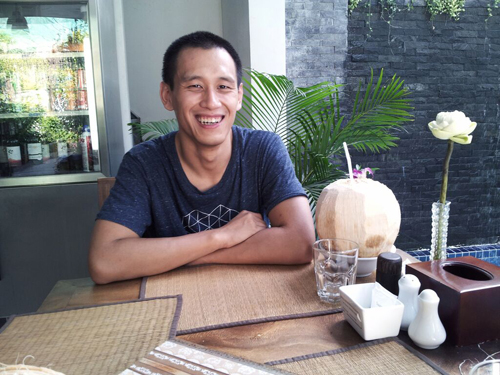By Dipika Kohli
Northwest Asian Weekly

Ki Chong Tran (Photo by Dipika Kohli/NWAW)
“DON’T BOX,” said Ki Chong Tran’s grandmother, worried what would happen when he moved to his mother’s native Phnom Penh.
“Boxing is for peasants.”
She needn’t worry.
After winning a professional mixed martial arts, or MMA, fight in Phuket in August 2013 against Thailand’s Kritsada “Dream Man” Konsrichai, the Los Angeles native is taking a break.
What was it like going into a situation like that, in real life?
“It’s five seconds before your heart goes crazy. It’s adrenaline. It’s fear. You want to run away. You also want to fight.”
He’d had a bit of practice before Phuket in Phnom Penh. Ignoring his grandmother’s advice, he took on a martial arts challenge—his first.
It wasn’t boxing, though. It was kickboxing. Against a Cambodian national hero.
“Tuk tuk drivers [from the crowd] recognized me afterwards, because I had fought Noun Sorya. Like they would say something like, ‘Hey you fought Noun Sorya!,’ since he was so famous. Or one of them would recognize me and tell their friend, ‘Hey this guy fought Noun Sorya!’”

In the ring (Photo by Singaporemven)
Sorya was “levels and levels above me, but an Australian fighter backed out of the fight at the last minute,” Tran says. “They needed ‘a foreigner.’” Not knowing at the time who, exactly, he was up against, Tran said he’d do it. “I wanted to see if I could take a punch.”
In he went. And stayed.
Unsurprisingly, the first-timer got knocked down.
Got up.
Down again.
Up.
“I keep going forward. Even if I’m losing, for some reason, I just don’t stop.”
No one thought it would go as long as it did.
But the favorite was tiring. People noticed. Then they worried. Then Sorya kneed Tran in the stomach. Then someone threw in the towel.
Tran had lost, but he had hit his first personal milestone: to compete.
This wasn’t training. This was real.
East and West
Growing up in Los Angeles, Tran was never that interested in sports. But in 1993, he got
wind of Brazilian jiu-jitsu, which captivated him. A pure kind of competition. Arm locks. Holds. The movie Fight Club made a second dent, and got him started training.
With jiu-jitsu, it’s gentle. From the outside it doesn’t seem like much. “It just looks like two guys hugging. But at least nobody’s trying to choke me.”
He credits his mother for his tenacity. Her long work hours and six- or seven-day-a-week shifts in LA taught him to push on, no matter what.
Ki Chong and his younger brother, Ki How, were just four and one when their parents brought them to Phnom Penh to live for a year. Things have shifted a lot since those days, the elder brother says, most notably the trash problem—“disgustingness and stench are nothing compared to what it was.”
In the years since, their parents have ferried to and from Cambodia from California, setting up a café Le Bon, in Riverside, which is still going. But recently, their mother has returned to California to take care of her father, who has fallen sick.
The Tran brothers are part of a wave of young Khmer-origin returnees setting up shops and businesses in Cambodia.
Lessons in martial arts, entrepreneurship
Tran came to Phnom Penh to go into business with his younger brother, Ki How. They started a 3D printing company, ARC Hub PNH, which says it “empowers 3D creators.”
The pair are affectionately known among friends like photojournalist Sotheavy Nou as “the 3D boys.”
A new hire, mechanical engineer Waseem Girach, calls the elder brother “a very smart dude” who’s open to letting him try new things.
Business and jiu-jitsu have a lot in common.
“Sometimes moves don’t work or you try an attack, and it fails miserably,” Tran says.
But failure is just a process. Things going wrong means you’re less likely to make the same mistake. “Failure is the cold hard reality that is absolutely indifferent whether your feelings get hurt, but if you don’t take it personally, then failure is also one of your greatest teachers. It’s only bad when it stops you from trying again.”
Girach had originally approached the brothers because, as a product developer, he had something he wanted to prototype. When he got there, the three found synergy, and Girach asked for a job. Now, the company is growing in ways that build on what the newcomer knows, too, making products part of their mix as they continue to iterate, one move at a time. (end)
ARC Hub PNH celebrates its one year anniversary in Phnom Penh on August 8.
Dipika Kohli can be reached at info@nwasianweekly.com.



